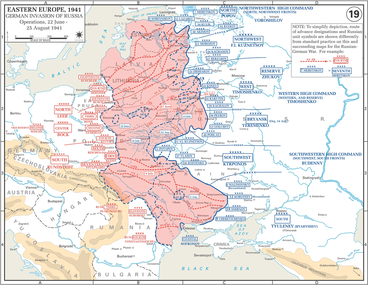 Operation Barbarossa – the German invasion of the Soviet Union – was launched on 22 June 1941. Although the Great Patriotic War, as it is called in Russia, began 81 years ago, and few people who remember it are still alive, the war continues to loom large in the collective consciousness of the former Soviet nations, including both Russia and Ukraine. The fight against fascism was the seminal experience of the Soviet Union’s very existence, and the victory over Nazi Germany, on 9 May 1945, is celebrated as a national holiday with enormous pomp and ceremony – particularly this year, in Russian president Vladimir Putin’s extravagant Victory Day parade. World War Two claimed the lives of up to 27 million Soviet citizens, a death toll that dwarfs that of any other country. The USSR suffered between 9 and 11.5 million military casualties, with possibly another 10 million civilian deaths caused by military activity, and famine or disease claiming a further 8 or 9 million lives. Another 14 million Soviet soldiers were wounded during the war. Among the Soviet Union’s 15 republics, Russia suffered the highest number of casualties, with nearly 7 million military and a similar number of civilian deaths. Ukraine’s death toll was the second highest at more than 1.5 million military deaths and over 5 million from the civilian population. When Germany invaded the USSR, it did so without making any declaration of war, and with a pre-dawn offensive starting at 4am. The parallels with 24 February 2022 are self-evident. In today’s war, both sides accuse each other of being modern-day Nazis. Russia is drawing heavily on its past wartime messages. Once again, its leadership talks of the fight against fascism, about completing the job it started in the 1940s and freeing Ukraine from neo-Nazis. For their part, Ukrainians are making similar analogies. They refer to Putin as ‘Putler’ – an amalgam of Putin and Hitler, calling Russian invaders ‘Russists’ – a combination of Russians and fascists. Making the parallels starker still, the excellent BBC podcast Ukrainecast reported last week that a popular Russian Twitter account that traces events from 81 years ago had been attacked by bots and trolls reacting to words like ‘dictator’ and ‘unprovoked attack’. For Hitler and the USSR, read Putin and Ukraine. The Nazi offensive back in 1941 was a three-pronged attack along a 1,800-mile front. In the north, the German army struck from East Prussia into the Baltic states towards Leningrad. In the centre came an attack pushing northeast to Smolensk and Moscow. And to the south, German troops invaded from southern Poland into Ukraine, heading for Kyiv and from there towards the coast of the Black Sea and Sea of Azov. I have written in my blog before about my own family’s experience in Ukraine during the Second World War – my grandmother’s cousin Moishe from Kyiv, a young Red Army conscript who died on 16 October 1944 near Warsaw, at the tender age of just 18. And another of my grandmother’s cousins, Baya, who was in Kyiv when the Nazis invaded. She and her husband were among a group of Jews forced to board a crowded boat on the River Dnieper, which runs through the centre of the city. The boat was then set alight and everyone on board perished. Other members of my family who lived in the Soviet Union at the time of the German invasion fled to the east, to Uzbekistan. Here the famine and disease that killed so many Soviet citizens during the war were in stark evidence. In the city of Kokand, they survived starvation levels of hunger and epidemics of typhus and other diseases in a city packed to the rafters with evacuees. And now, once again, millions are at risk of famine as a result of war in Europe, as the Russian blockade of Ukraine’s Black Sea ports has trapped more than 20 million tonnes of grain that would normally be exported. The tragedy of the war is already impacting millions of people far beyond the borders of Ukraine, making all our futures more uncertain than ever.
0 Comments
Leave a Reply. |
Keeping stories aliveThis blog aims to discuss historical events relating to the Jewish communities of Ukraine, and of Eastern Europe more widely. As a storyteller, I hope to keep alive stories of the past and remember those who told or experienced them. Like so many others, I am deeply troubled by the war in Ukraine and for the foreseeable future, most articles published here will focus on the war, with an emphasis on parallels with other tumultuous periods in Ukraine's tragic history. Archives
March 2024
Categories
All
|
 RSS Feed
RSS Feed
